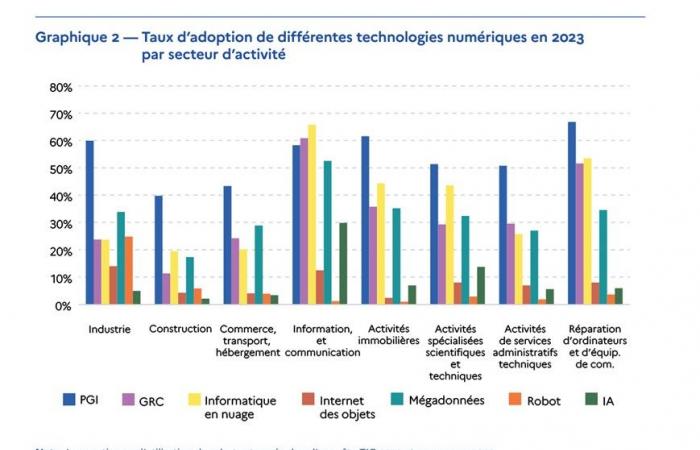In 2024, industrial digitalization in France reaches a decisive turning point. This process, a key driver of industry 4.0, is based on the integration of digital technologies into production processes. The objective is to increase productivity, reduce costs and respond to environmental issues. With initiatives like France 2030 or investments in industrial 5G, the country is actively engaged in this transformation. But what are the results obtained to date, and what prospects are emerging for 2030? This article provides an overview of progress and sheds light on future trends in industrial digitalization in France.
What is industrial digitalization?
Definition and challenges of industrial digitalization
Industrial digitalization refers to the integration of advanced technologies into production and management processes within industries. This includes tools such as digital twins, IoT, predictive analytics software and artificial intelligence (AI). These technologies enable the creation of smart, connected factories, where process management is optimized and efficiency is increased.
The main objectives of digitalization are:
- improve efficiency production through process automation;
- reduce costs production by optimizing energy consumption and minimizing losses;
- anticipate breakdowns with the use of predictive systems that help reduce production interruptions.
By integrating these technologies, industrial digitalization allows companies to prepare for future challenges, while being more competitive and sustainable. It is part of a process of evolution towards industry 4.0, a concept which encompasses a complete digital transformation of manufacturing processes.
Why is digital transformation crucial for industrial companies?
The transition to a digital industry is essential for several reasons:
- International competitiveness : France must intensify its efforts to catch up with countries like Germany, a pioneer of industry 4.0. Digitalization is essential to maintain and strengthen the competitiveness of French companies on a global scale.
- Reduction of environmental impacts : by optimizing production chains and adopting more energy efficient systems, companies can significantly reduce their carbon footprint. For example, Schneider Electric uses AI to reduce its energy consumption and improve its environmental impact.
Digital transformation thus makes it possible to respond to environmental challenges while remaining competitive in an increasingly demanding global market.
Current assessment of industrial digitalization in France
Recent progress in France on the digital transition of industrial companies
Since 2020, several initiatives have been launched to support the digitalization of industrial companies in France:
- Public and private investments : the France 2030 program has allocated more than 1.2 billion euros to digital transformation projects in industry (source:entreprises.gouv.fr).
- Adoption of digital technologies : in 2024, 64% of French manufacturing companies will use digital tools such as predictive maintenance and automation to optimize their processes (source: Themas N°24, 2024).
- Training and support : schemes like those offered by Bpifrance help SMEs integrate digital tools and train in new technologies.
The France 2030 program is a 54 billion euro investment plan to modernize French industry and support the ecological transition. It focuses on key areas such as green mobility, green hydrogen and the healthcare industry, with the aim of developing innovative technologies and reducing greenhouse gas emissions.
Source: Themas, N°24, 2024
This progress is significant, but several obstacles remain, particularly in terms of skills and infrastructure.
Transforming the industry through digital: challenges still present
Although progress is notable, certain challenges are holding back the full adoption of industrial digitalization:
- Lack of skills : the shortage of experts in cybersecurity, AI, and industrial cloud computing remains a major obstacle for companies. The digital skills of employees are crucial to support this transformation.
- SMEs lagging behind : only 45% of French SMEs have a clear digital strategy (source: francenum.gouv.fr), which limits their ability to adopt these advanced technologies.
- Infrastructure fragmentation : fiber optic and industrial 5G coverage remains uneven nationally, which hampers the implementation of advanced digital technologies.
Despite these obstacles, the continued efforts of public and private actors are essential to enable France to overcome these challenges.
Outlook for 2030: what trends for the digital transformation of the industrial sector?
Essential technologies around industrial digitalization
The technological innovations that will shape French industry by 2030 are numerous:
- L’artificial intelligence (AI): AI is expected to play a central role, particularly in predictive maintenance and energy resource management.
- IoT et Big Data : real-time monitoring of production chains will reduce losses and improve product quality.
- Digital twins : these tools will make it possible to simulate and optimize industrial processes before their actual implementation.
- industrial 5G : 5G will provide increased connectivity between machines and operators, speeding up data flows and coordination.
Sectors transformed by industrial digitalization
By 2030, several sectors will be profoundly transformed by industrial digitalization:
- Automotive industry : factories will have to be more flexible, capable of producing autonomous and electric vehicles in small series.
- Energy industry : digitalization will facilitate the integration of renewable energies thanks to optimized management systems.
- Health sector : 3D printing and additive manufacturing will make it possible to produce tailor-made medical devices, thus better meeting the needs of patients.
European vision and digital strategy
The European Union’s Digital Decade 2030 strategy aims to strengthen the digital autonomy of member states, with a focus on strategic technologies such as AI and the sovereign cloud (source: commission.europa.eu). France, as a member of the EU, must play a key role in this dynamic to guarantee its digital sovereignty.
Strengthening French digital sovereignty
Technological independence and local innovation
Digital sovereignty is a major issue for France. The adoption of French and European digital solutions is essential to ensure the security of industrial data and reduce dependence on foreign players. Local initiatives, such as OVHcloud, which develops sovereign cloud solutions, are essential assets to guarantee this independence.
Support for local innovation, with companies like Mistral AI and Hugging Face, helps strengthen France’s position in the field of artificial intelligence. These players play a key role in the development of tailor-made solutions for French industries.
Regulatory framework and ecosystem collaboration
A robust regulatory framework, respecting standards such as GDPR, is essential to secure sensitive data. Collaboration between large groups, SMEs and startups will pool resources and accelerate innovation in the digital industry.
Frequently asked questions about industrial digitalization
What costs should be expected for the deployment of digital technologies in an SME?
The costs of digitalization vary depending on the size and specific needs of the business. However, schemes like France 2030 and regional subsidies help reduce investment costs.
What support exists for industrial companies and their digitalization?
Initiatives like France Num or the Industry of the Future program offer technical and financial support, as does Bpifrance.
How to start a digital transformation?
Companies must prioritize their specific needs, identify the appropriate tools and rely on local experts or industrial clusters to succeed in their digital transformation.
Industrial digitalization represents a major strategic challenge for the competitiveness and sustainability of French companies. Although significant progress has been made through public and private initiatives, many challenges remain, particularly around skills and infrastructure. By 2030, France must continue to invest in local digital solutions and strengthen its technological independence to assert itself as a world leader in industry 4.0. Digital transformation is an essential opportunity for French companies, which must commit today to remain competitive and innovative in an increasingly digitalized global environment.
Sources :
Ministry of Economy, Finance and Industry
General management of companies
European Commission
France Num







